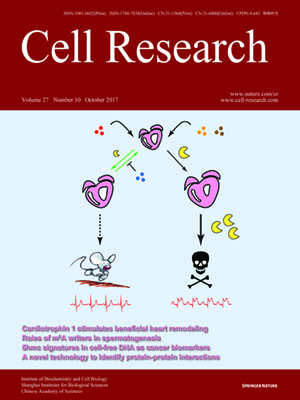
Volume 27, No 10, Oct 2017
ISSN: 1001-0602
EISSN: 1748-7838 2018
impact factor 17.848*
(Clarivate Analytics, 2019)
Volume 27 Issue 10, October 2017: 1216-1230
ORIGINAL ARTICLE
Mettl3-/Mettl14-mediated mRNA N6-methyladenosine modulates murine spermatogenesis
Zhen Lin1, Phillip J Hsu2,*, Xudong Xing3,*, Jianhuo Fang3, Zhike Lu2, Qin Zou3, Ke-Jia Zhang1, Xiao Zhang4, Yuchuan Zhou1, Teng Zhang1, Youcheng Zhang1, Wanlu Song3, Guifang Jia4, Xuerui Yang3, Chuan He2,4 and Ming-Han Tong1
1State Key Laboratory of Molecular Biology Shanghai Key Laboratory of Molecular Andrology, CAS Center for Excellence in Molecular Cell Science, Shanghai Institute of Biochemistry and Cell Biology, Chinese Academy of Sciences, University of Chinese Academy of Sciences, Shanghai 200031, China
2Department of Chemistry, Department of Biochemistry and Molecular Biology, Institute for Biophysical Dynamics, Howard Hughes Medical Institute, The University of Chicago, 929 East 57th Street, Chicago, IL 60637, USA
3MOE Key Laboratory of Bioinformatics, Center for Synthetic & Systems Biology, THU-PKU Center for Life Sciences, School of Life Sciences, Tsinghua University, Beijing 100084, China
4Synthetic and Functional Biomolecules Center, Beijing National Laboratory for Molecular Sciences, Key Laboratory of Bioorganic Chemistry and Molecular Engineering of Ministry of Education, College of Chemistry and Molecular Engineering, Peking University, Beijing 100871, China
Correspondence: Ming-Han Tong, Tel: 86-21-5492-1264 E-mail: minghan@sibcb.ac.cn; Chuan He, E-mail: chuanhe@uchicago.edu; Xuerui Yang,(yangxuerui@tsinghua.edu.cn)
Spermatogenesis is a differentiation process during which diploid spermatogonial stem cells (SSCs) produce haploid spermatozoa. This highly specialized process is precisely controlled at the transcriptional, posttranscriptional, and translational levels. Here we report that N6-methyladenosine (m6A), an epitranscriptomic mark regulating gene expression, plays essential roles during spermatogenesis. We present comprehensive m6A mRNA methylomes of mouse spermatogenic cells from five developmental stages: undifferentiated spermatogonia, type A1 spermatogonia, preleptotene spermatocytes, pachytene/diplotene spermatocytes, and round spermatids. Germ cell-specific inactivation of the m6A RNA methyltransferase Mettl3 or Mettl14 with Vasa-Cre causes loss of m6A and depletion of SSCs. m6A depletion dysregulates translation of transcripts that are required for SSC proliferation/differentiation. Combined deletion of Mettl3 and Mettl14 in advanced germ cells with Stra8-GFPCre disrupts spermiogenesis, whereas mice with single deletion of either Mettl3 or Mettl14 in advanced germ cells show normal spermatogenesis. The spermatids from double-mutant mice exhibit impaired translation of haploid-specific genes that are essential for spermiogenesis. This study highlights crucial roles of mRNA m6A modification in germline development, potentially ensuring coordinated translation at different stages of spermatogenesis.
10.1038/cr.2017.117
FULL TEXT | PDF
Browse 1713


